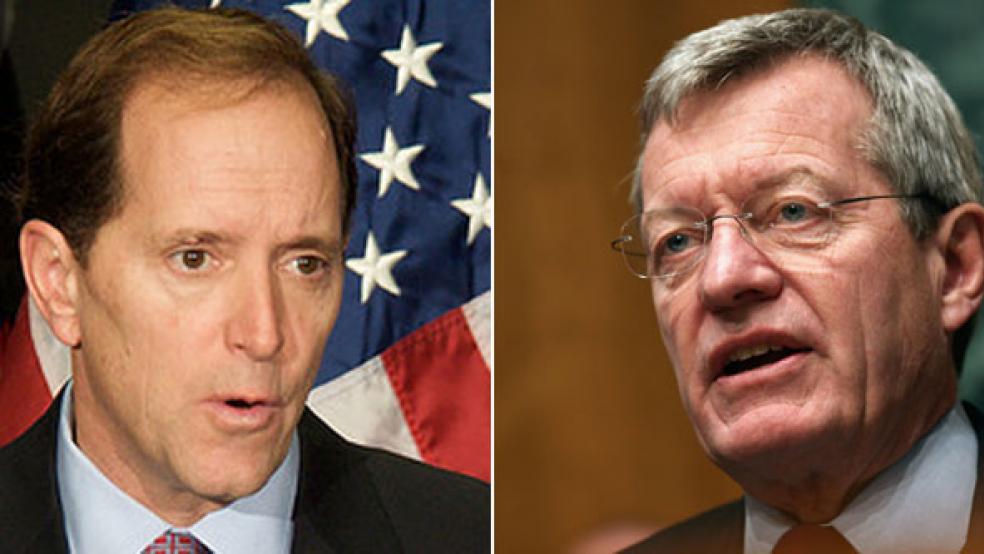By most counts, tax reform appears to be dead.
Congress has struggled to find common ground on immigration, the farm bill, and the basic contours of a budget. And overhauling the tax code touches on the defining split between Republicans and Democrats.

RELATED: THE FUTURE OF AMERICAN HOUSING HANGS ON CONGRESS
President Obama and Democratic lawmakers want to simplify the tax code to increase revenues, while House Republicans have pledged to oppose any changes designed to put a dime more in the federal coffers. After all, congressional Republicans already feel as if they were strong-armed into a rate hike with the fiscal cliff deal earlier this year.
But Sen. Max Baucus (D-MT) and Rep. Dave Camp (R-MI) are keeping hope alive. Both peg the odds of reform at more than 50 percent, according to a joint lunch appearance Thursday before the Economic Club of Washington.
The duo think a personal touch can succeed, where committees, congressional hearings, and TV debates have failed. They recently took their tax reform roadshow to Scotch tape-maker 3M and a Minnesota bakery, with plans for another meeting for small business owners in Philadelphia.
Baucus, chairman of the Senate Finance Committee, based his optimism on public frustration. Companies generally dislike the top marginal corporate rate of 35 percent, a relatively high level compared to foreign competitors. Plenty of individuals despise having to muddle through complex tax software, possibly missing out on valuable deductions.
“Everyone knows the code is dated,” said Baucus, repeatedly noting that the last overhaul happened back in 1986 – an era when the Soviet Union was the dominant national security threat, the Internet seemed a lot like science fiction, and Obama was a community organizer in Chicago.
The federal government collects about $2.7 trillion a year – so the outcome of their push would impact 17 percent of the U.S. economy. Both chambers would have to develop bills separately that would later be reconciled in conference committee.
Camp, chairman of the House Ways and Means Committee, did not address how any plan could bridge an ideological divide. But half of the lawmakers’ task for the moment is educating fellow members and understanding the mechanics of the tax code.
ROADBLOCKS FOR REFORM?
One frequently cited roadblock for reform is that Congress would not jeopardize popular deductions – such as the mortgage-interest write-off – in order to lower rates.
Major companies are also lobbying to preserve tax breaks that are highly targeted for their industries. More than 125 lobbyists and law firms are attached to the push.
In hearings before Camp’s committee last year, a 3M executive endorsed lowering the top marginal corporate tax rate to 25 percent. If several breaks were eliminated to cover the cost of reduced rates, 3M could theoretically have a higher tab with the IRS.
For an approach that wipes the slate clean and would create the code anew, these issues are more technocratic in nature, instead of ideological.
“It’s not as partisan as you might think on some of these items,” said Camp.
The two lawmakers claimed to have learned from previous failed attempts at bipartisan outreach. Both served in 2011 on the so-called Super Committee, the bipartisan group whose inability to agree on a deficit reduction plan triggered roughly $1 trillion in automatic cuts under sequestration. That effort failed, in part, Baucus noted, because its two chairmen – Rep. Jeb Hensarling (R-TX) and Sen. Patty Murray (D-WA) – had never met each other before.
“The idea that this small group of people will impose something on the rest of Congress is not going to work,” said Camp.
GOING ‘MAN TO MAN’
Instead, this time they’re trying to work face to face. Camp is still making the rounds on Capitol Hill to meet with every House Republican freshman, while Baucus aims for “man-on-man” meetings with other senators.
“We put together burgers and beers at Irish Times twice a month,” Baucus said.
The White House has played a low-key role, since Obama’s involvement could easily polarize Republicans and guarantee that cooperation does not occur. But this is only the input phase of tax reform, as the two lawmakers are just gathering opinions from other lawmakers and the public through the website TaxReform.gov.
It’s possible to speak optimistically because the most contentious differences on Capitol Hill have yet to be part of the conversation. Baucus and Camp are not sharing at this time some of the input they’re received from other lawmakers.
“We’re keeping them confidential, because we want to encourage candid conversation with our members,” Baucus.
Camp, however, indicated that any reform would likely not involve a European-style Value Added Tax, as the consumption-based charge would add another layer to the code.
Baucus and Camp must complete this relatively heavy lift in just 18 months. The Michigan congressman is scheduled to lose his chairmanship of Ways and Means in 2014 due to term limits. Meanwhile, Baucus has decided to retire from the Senate after six terms.
Former Senate Budget Committee Chairman Kent Conrad (D-ND) also used a retirement strategy last year in hopes of forging a budget deal. But his effort proved fruitless, as the government continued to slog along.
Baucus said his retirement has freed him to focus on tax reform, since he no longer has to devote time to fundraising. “I don’t have to go out there with my tin cup,” he said. “It’s helping a lot.”




